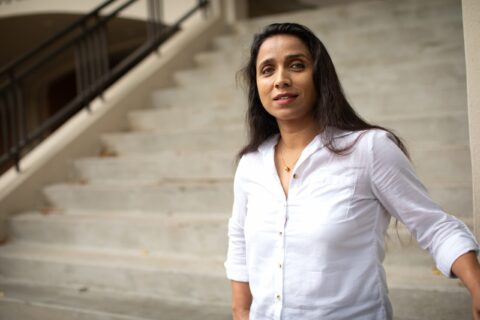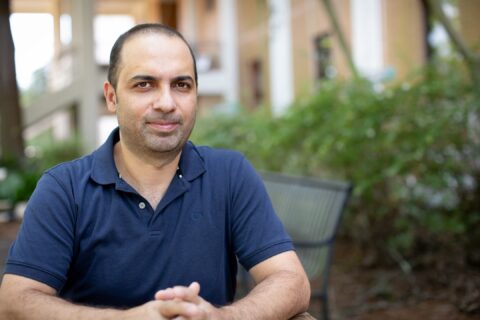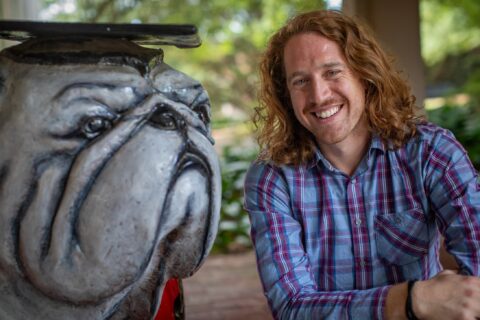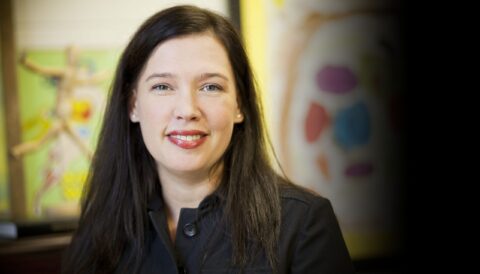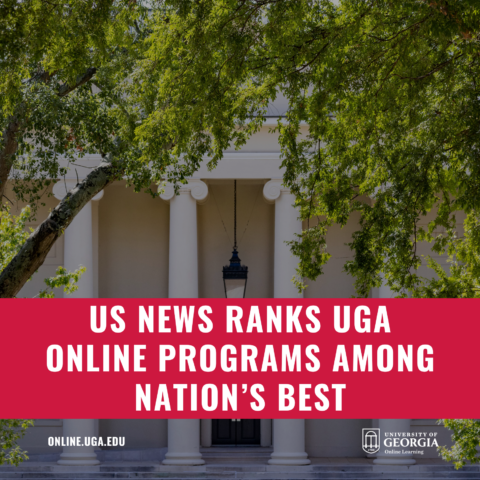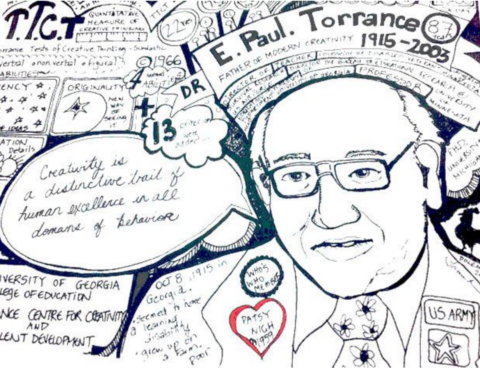Educational Specialist (Ed.S.) in Educational Psychology – Gifted & Creative Education
Educational Specialist (Ed.S.) in Educational Psychology – Gifted & Creative Education

I am focused on solving the mysteries of why some gifted students do well in school & others do not meet their potential. I see my role as a teacher to design coursework & experiences to help teachers learn how to reach these students.
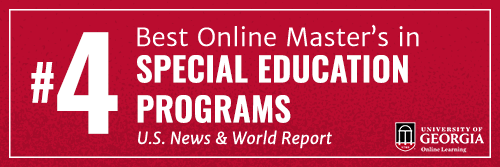
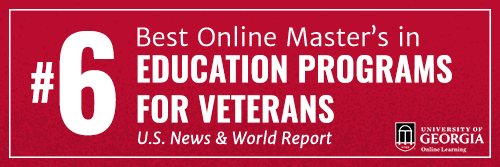
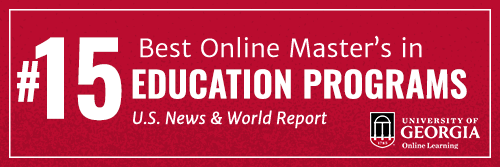
Overview
Offered through the Mary Frances Early College of Education, the University of Georgia’s online Ed.S. in Educational Psychology, Gifted and Creative Education is based on the philosophy that giftedness and creativity are expressed in diverse ways among diverse people; that creativity is a universal potential to be nurtured and enhanced; and that the best education is tailored to students’ specific needs and interests for talent development. This philosophy will be expressed through a focus on instruction, research, and service.
The Ed.S. program requires a minimum of 31 semester hours of coursework and a final written comprehensive examination. After completing the first four courses, you will qualify for the Gifted In-Field Endorsement for the State of Georgia. Graduates from this program may assume a variety of roles including those of college or university professor, classroom teacher, coordinator of school system programs, coordinator in state departments of education, or educational consultant
Accreditations
The University of Georgia is accredited by the Southern Association of Colleges and Schools Commission on Colleges (SACSCOC) to award baccalaureate, master’s, specialist, and doctoral degrees. The University of Georgia also may offer credentials such as certificates and diplomas at approved degree levels. Questions about the accreditation of the University of Georgia may be directed in writing to the Southern Association of Colleges and Schools Commission on Colleges at 1866 Southern Lane, Decatur, GA 30033-4097, by calling (404) 679-4500, or by using information available on SACSCOC’s website (www.sacscoc.org).
Admissions
Credit and Transfer
Total Hours Required to Earn Degree: 31 (credit hours)
Maximum Hours Transferable into Program: 6
Only transfer credits from an accredited institution will be considered. If transfer credit is awarded, it will still be necessary to complete the required number of hours to graduate, which will more than likely necessitate additional coursework above and beyond the degree program requirements.
Online Ed.S. Degree in Educational Psychology Admission Requirements
- Hold a master’s degree from an accredited college or university
- Have cumulative grade point average for all previous undergraduate courses as being 2.6 or above on the 4-point scale
- Graduate Record Examination (GRE) or Miller Analogies Test (MAT) scores are accepted but not required.
- Provide three letters of recommendation from people who know you professionally or as a scholar
- Develop a statement of purposes and goals that can reasonably be met by the degree program
Online Ed.S. Degree in Educational Psychology Application Checklist
- Application – Submit online to the Graduate School Admissions. Application fee: $75 Domestic/$100 International (waived for US veterans).
- Select Campus – Online
- Select Intended Program – EDS, Educational Psychology (Educational Psychology) [EDS_EPSY_ONL]
- Select Area of Emphasis – Gifted and Creative Education
- Résumé or curriculum vita – Upload to the Graduate School application.
- Statement of Purpose – Submit a one-page statement of purpose online to the Graduate School. The statement of intent should clarify the candidate’s relevant background, interests, and goals in relation to the program.
- Transcripts – Submit unofficial transcripts from all institutions attended as part of the Graduate School application. Send official transcripts after you are offered admission.
- Letters of Recommendation – Submit three letters of recommendation online to graduate school. Letters should be from individuals who can evaluate the applicant’s scholarly ability and potential for success in a graduate program. Preferably at least two of them are from faculty who have instructed the applicant in a previous program of study. The application will prompt your recommenders to submit their letters electronically.
Application Deadlines
Domestic Applicants
Spring: November 15
Summer: March 1
International Applicants
Spring: October 15
Summer: February 15
Cost
Tuition & Fees
Tuition rates and student fees may change each year.
Based on the 2024-25 credit-hour cost, a person who had completed this program at the recommended pace would have paid $20,640 in tuition. Reference this sheet to identify the current credit hour rate for your program of interest.
Please use the Estimated Cost Calculator on the Bursar’s Office website to calculate one academic (Fall/Spring) year’s tuition.
This program is an E-Rate program, so choose “yes” for the E-Rate line item within the calculator.
Fees for those students enrolled in exclusively online programs are $422 per semester.
Potential additional costs include:
- Textbooks
- Exam proctoring fees
- Technology upgrades
The complete cost of attendance can be found at https://osfa.uga.edu/costs/.
Financial Aid
Visit the Office of Student Financial Aid for information about financial assistance.
Corporate Assistance
Consult your employer about the availability of tuition reimbursement or tuition assistance programs.
Military Assistance
Active-duty military, veterans, and military families should visit Veterans Educational Benefits to take full advantage of available financial assistance and educational benefits.
University System of Georgia Tuition Assistance Program (TAP)
The purpose of TAP is to foster the professional growth and development of eligible employees. For more information, see Tuition Assistance (refer to the Distance Learning section).
Technology Requirements
- Computer with current operating system (Windows, Mac, or Linux). Additional peripherals such as webcam, headphones, and microphone are required.
- High-speed internet access.
Curriculum
Online Ed.S. Degree in Educational Psychology Program Structure
This degree requires a minimum of 31 semester hours of course work beyond the Master’s degree and an Applied Project. Students can pursue programs of study according to their experience in gifted education.
Courses
| First Term | Second Term | |
|---|---|---|
| Year 1 | EPSY 7110e: Characteristics of Gifted Children and Youth EPSY 7060e: Assessment of Gifted Children and Youth EPSY 6990e: Seminar in Gifted Education (1 hour) | EPSY 7230e: Methods and Materials for the Gifted EPSY 7250e: Programming and Curriculum for the Gifted |
For subsequent semesters, students will work with their advisors to assemble their programs of study.
Social and Emotional Strand (3 hours)
- EPSY 7260e: Supporting the Social and Emotional Development of the Gifted
Diversity Strand (3 hours)
- EPSY 7270e: Retention of Ethnic Minorities in Gifted and Advanced Programs
- EPSY 7210e: Multicultural Gifted and Talented Education
Creative Strand (3 hours)
- EPSY 7240e: Creativity: Instructional Procedures and Problem-Solving Processes
- EPSY 8160e: Creativity and Cognition
Educational Psychology Foundations Strand (3 hours)
- EPSY 6010e: Human Development for Education
- EPSY 6800e: Cognition for Education
- EPSY 8160e: Creativity and Cognition
Research Strand (3 hours)
- ERSH 7500e: Action Research
- EPSY 8160e: Applied Research Methods in Gifted Education
- ESPY 6200e: Research Methods in Education
Field Experiences (3 hours)
- EPSY 7110e: Practicum in Educational Psychology
Applied Project in Gifted Education (3 hours)
- EPSY 7650e: Applied Project in Gifted Education
Licensure
This program is designed to help you accomplish one of two things. First, it may enable you to serve as a licensed professional through initial certification, obtain a required add-on to certification, or become eligible to take a state-mandated test in Georgia. If you apply to this program from a state outside of Georgia but intend to obtain initial certification to work in Georgia, you will be given the opportunity to attest to that intention.
Second, you may select to enroll in this program as a certified practitioner seeking professional development or advancement in a licensed profession without intending to pursue additional certification. If you are seeking advancement in your current licensed profession, we ask that you affirm that during the admissions process.
An enrollment coach will contact you to determine your circumstances and ensure that this program will be effective for you.
Additional information and disclosures regarding state licensure for professional practice in this field can be found at the UGA Licensure Disclosure Portal.
Faculty
News & Events
TEDxUGA 2024: Coming to a Computer Screen Near You
March 25, 2024TEDxUGA returns in 2024, and this time, you’ll be able to watch from home. Hosted by the New Media Institute out of Grady College but run by faculty and staff from across campus, TEDxUGA seeks to explore the candid experiences, groundbreaking research, and innovative scholarship that will frame the future through live presentations and talks by UGA’s leading thinkers and doers.
US News Ranks UGA Online Programs Among Nation’s Best
February 7, 2024U.S. News & World Report released their 2024 Best Online Programs rankings with several of the University of Georgia online programs in the top 10.
Spots Still Available for the Torrance Tests of Creative Thinking Summer Training Program
July 7, 2016For educators, especially in the area of gifted and creative education, the Torrance Tests of Creative Thinking (TTCT) are highly respected and very important assessment tools. In fact, because the TTCTs are the most highly reliable and widely used tests of their kind, there is a need for teachers who are properly trained to offer them.
Testimonials
“I learned about UGA’s Educational Psychology program through researching online gifted education graduate programs. Every website and blog I found ranked UGA’s program as one of the top online programs available in the field. I knew online learning would broaden my opportunity to learn from institutions well-versed in my desired field. Also, living and teaching full-time in busy Los Angeles, I wanted to experience an education that could flexibly fit my schedule, without having to worry about longer commutes and rigid schedules.”
Sarah Careolo, ’20
“I chose this program for personal reasons, and I also think it’s a good way for me to re-enter school and re-align my professional objectives with my personal ones. It’s been a huge learning curve for me because my degrees aren’t in education, but I would say with teaching English, the experience is there. It’s a huge learning curve but if you’re into it, you can definitely succeed.”
Sylvie Okada Yamada, ’14
“I craved a degree program that would allow me to work at a substantial pace without feeling overwhelmed if I wasn’t able to complete certain tasks/assignments during the daytime. The courses I’ve taken have allowed me to grow not only as a person but as an educator as well. Looking back, I feel that I am more cognizant, perceptive, passionate, and most importantly, human, when it comes to my students and being in the classroom. We all make mistakes and have rough days. In the end, we are all in this together and you never know what a student may end up teaching you about life!”
Darius Phelps, ’21
Contact Information
Contact us using the request for information form or call 706-948-2598.

